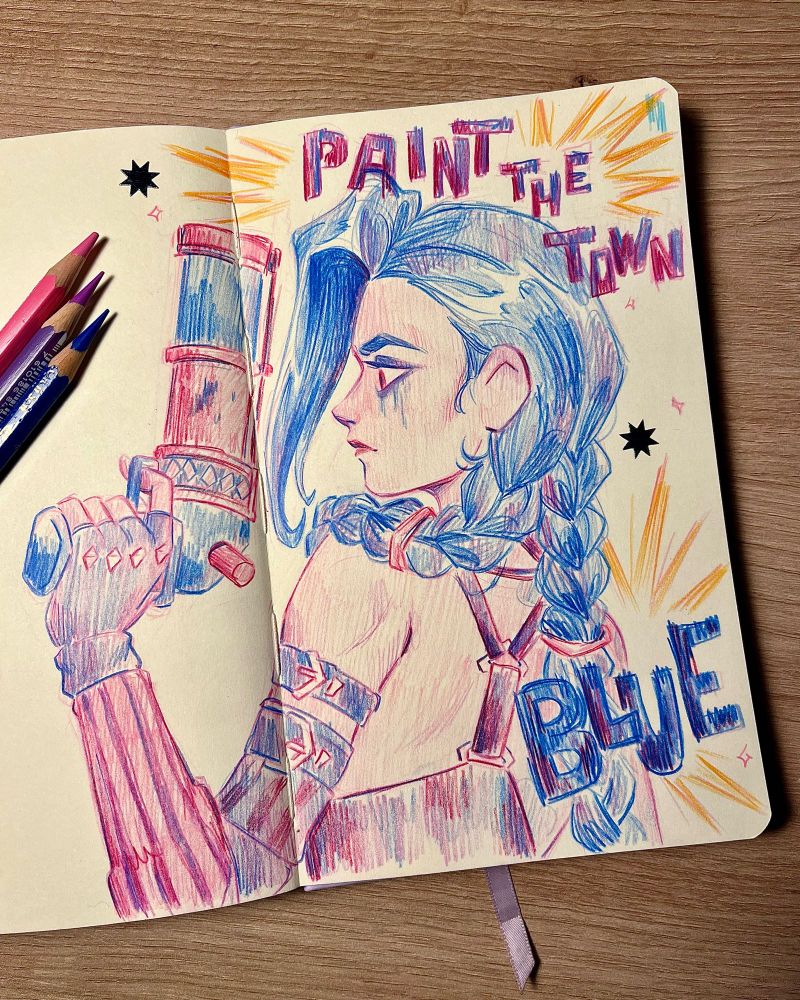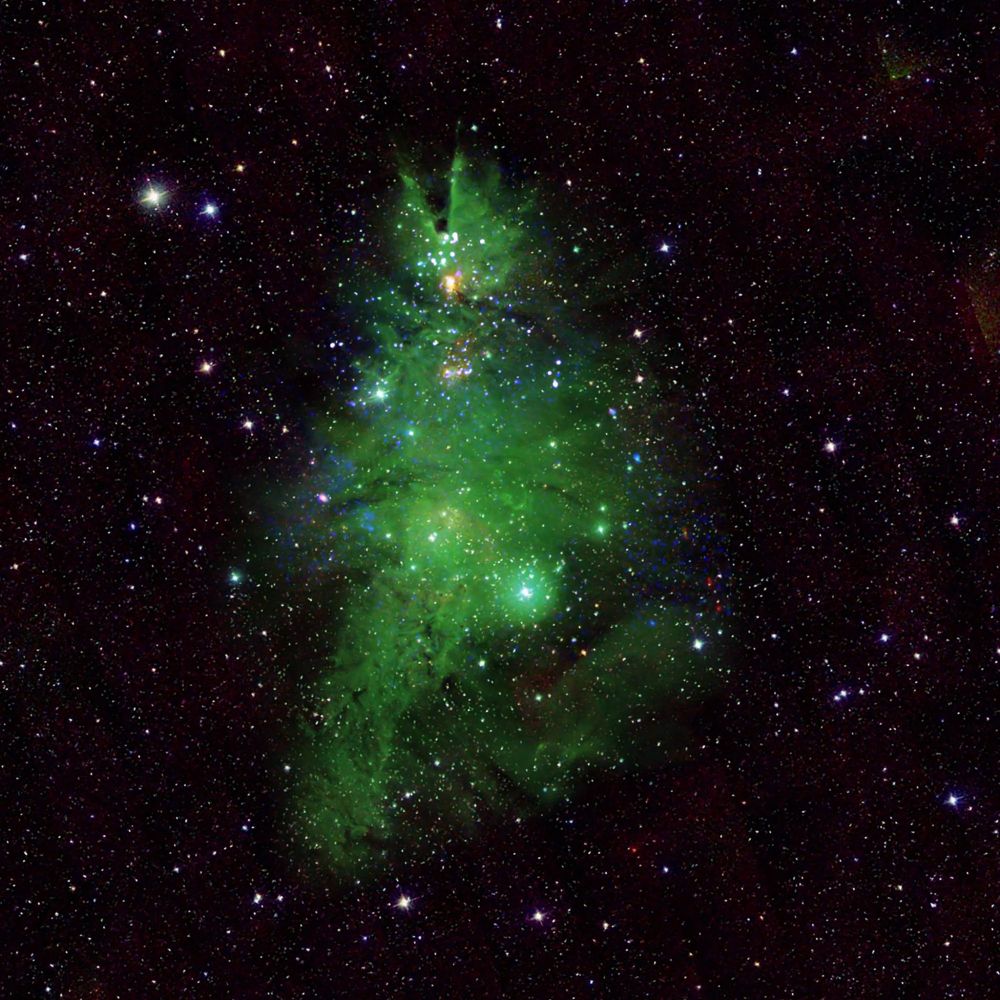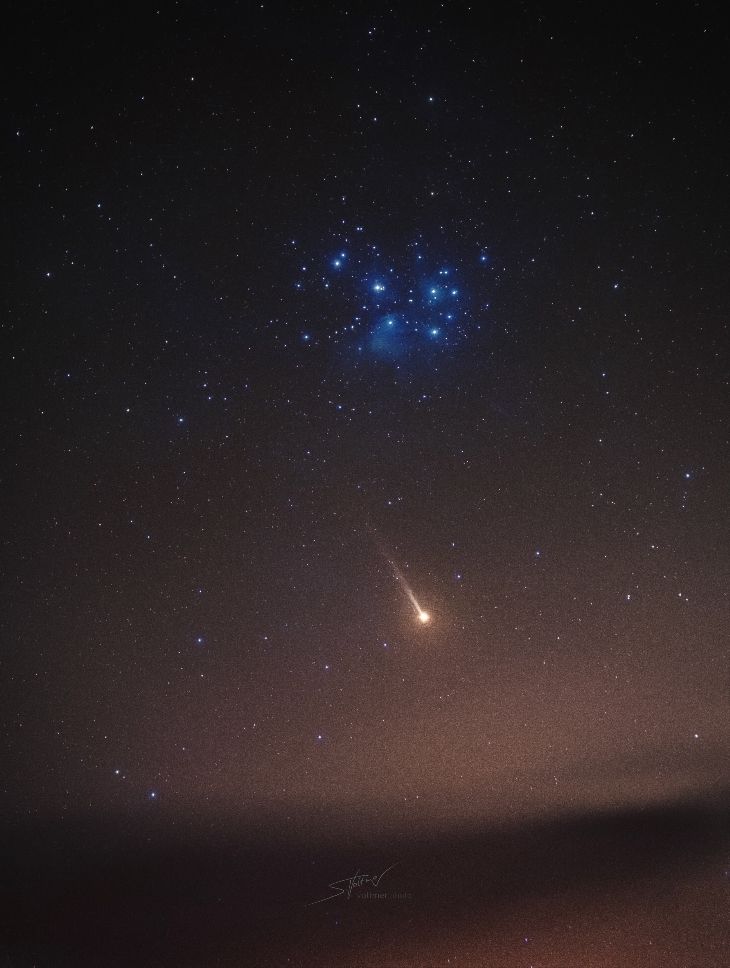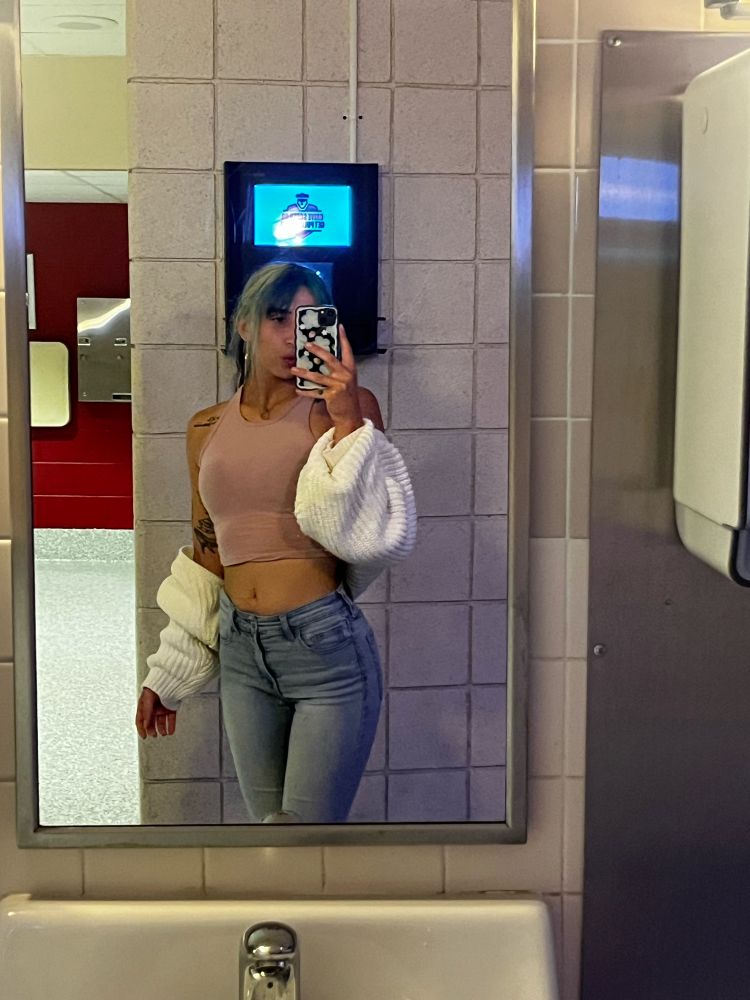Okay but hear me out:
A nighttime bookstore in which the only lighting comes from lanterns, tea is served to all who enter, there is an emotional support owl in each section, and a buy one / get one free sale occurs during every full moon.
23.11.2024 13:18 — 👍 23725 🔁 2155 💬 1320 📌 316

#RESIST 🇺🇸
23.11.2024 15:35 — 👍 63785 🔁 9238 💬 1494 📌 436
love love love
23.11.2024 16:12 — 👍 0 🔁 0 💬 0 📌 0
11:11 @star-saber.bsky.social
23.11.2024 16:12 — 👍 1 🔁 0 💬 1 📌 0
I WANT MY MOOTS ON HERE
23.11.2024 02:51 — 👍 0 🔁 0 💬 0 📌 0
Hearts in Atlantis was just weird but I liked it so much that I remember it after all these years. I might just give it a reread since it’s been so long that I can’t remember a lot.
23.11.2024 02:41 — 👍 0 🔁 0 💬 0 📌 0

The planet Uranus on a black background. The planet appears light blue with a large, white patch on the right side. On the edge of that patch at the upper left is a bright white spot. Another white spot is located on the left side of the planet at the 9 o’clock position. Around the planet is a system of nested rings. The outermost ring is the brightest while the innermost ring is the faintest. Unlike Saturn’s horizontal rings, the rings of Uranus are vertical and so they appear to surround the planet.

The image is divided horizontally by an undulating line between a cloudscape forming a nebula along the bottom portion and a comparatively clear upper portion. Speckled across both portions is a starfield, showing innumerable stars of many sizes. The smallest of these are small, distant, and faint points of light. The largest of these appear larger, closer, brighter, and more fully resolved with 8-point diffraction spikes. The upper portion of the image is blueish, and has wispy translucent cloud-like streaks rising from the nebula below. The orangish cloudy formation in the bottom half varies in density and ranges from translucent to opaque. The stars vary in color, the majority of which, have a blue or orange hue. The cloud-like structure of the nebula contains ridges, peaks, and valleys – an appearance very similar to a mountain range. Three long diffraction spikes from the top right edge of the image suggest the presence of a large star just out of view.

A prominent, eight-pointed star shines in bright white at the center of this image. A clumpy cloud of material surrounds this central star, with more material above and below than on the sides, in some places allowing background stars to peek through. The cloud material is a dark yellow closer to the star, and turns a pinkish purple at its outer edges. Combined together, the central star and its cloud resemble the delicate petals of a cherry blossom. The black background features many smaller white stars scattered throughout.

This image of the Ring Nebula, taken by Webb’s Near-Infrared Camera, appears as a distorted doughnut. The nebula’s inner cavity hosts shades of blue and green, while the detailed ring transitions through shades of orange in the inner regions and pink in the outer region. The ring’s inner region has distinct filament elements. Stars litter the scene, with a particularly prominent star with 8 long spikes in the top right corner.
this is how pretty you are btw
22.11.2024 04:40 — 👍 592 🔁 97 💬 17 📌 8
thank FREAKING GOD
20.11.2024 00:33 — 👍 0 🔁 0 💬 0 📌 0

Paint the town blue💥
#Arcane #Jinx
18.11.2024 15:51 — 👍 31862 🔁 2897 💬 196 📌 41
basic bitch
19.11.2024 02:36 — 👍 0 🔁 0 💬 0 📌 0
do i make bracelets or read a book
18.11.2024 23:09 — 👍 1 🔁 0 💬 0 📌 0
felt like it was time to post a cute lil pic on here + it should be centered around my current new obsession
18.11.2024 23:06 — 👍 1 🔁 0 💬 0 📌 0


took pics to send to the dealer to sell my Supra, but now I’m having sellers remorse and want to keep it lol
18.11.2024 20:42 — 👍 3 🔁 1 💬 0 📌 0

NASA’s new rendering of the Christmas Tree Nebula
18.11.2024 05:52 — 👍 35852 🔁 2849 💬 303 📌 235

Several bright-white, bluish, and orange stars shine with diffraction spikes, interspersed throughout dark dust. Particularly dark regions of gas and dust are seen near the lower left.

The Crab Nebula. An oval with complex structure extends from lower left to upper right against a black background. On the oval’s exterior lie curtains of glowing yellow and green fluffy material. Its interior shell shows large-scale loops of mottled filaments of yellow-white and green, studded with clumps and knots. Translucent thin ribbons of smoky blue lie within the remnant’s interior, brightest toward its center. The blue material follows different directions throughout, including sometimes sharply curving away from certain regions within the remnant. A faint, wispy ring of blue material encircles the very center of the nebula. Around and within the supernova remnant are many points of blue, green, purple, and white light.

A spiral galaxy seen nearly face-on. The disk holds many tightly wound spiral arms. They contain small strands of reddish dust, near the center. On the left side, the disk features glowing patches of star formation. The whole right side, and part of the center, is obscured by a large cloud of dark gas which crosses the image.

Hundreds of stars and galaxies in varying shapes, sizes and colors on a black background. Two of the largest, most prominent stars can be found in the top left quadrant and near the bottom right edge, respectively. They are tinged with blue and have an eight-point diffraction spike pattern. Near the center of this image is the ZS7 system, made up of a merger between two galaxies and their black holes. The ZS7 system is not easily seen by the naked eye in this image, as it looks like very small red dots.
sorry, i spaced out… 🌌
18.11.2024 04:09 — 👍 751 🔁 82 💬 13 📌 2
levar fucking burton on bluesky??? green flag (for the site, he’s perf)
18.11.2024 20:05 — 👍 1 🔁 0 💬 0 📌 0
ISS /EXPEDITION 13
#SPACE #SHUTTLE / MISSIONS / STS-121
Orbiter: #Discovery
Sábado 15 Julio 2006
Distant view of the International Space Station (ISS) from the orbiter Discovery as it moves away from the station after undocking.
wikiarchives.space/picture.php?...
NASA/j. Roger
18.11.2024 18:23 — 👍 26 🔁 5 💬 0 📌 0

This image was created from a composite of several images from Webb. Visible auroras extend to high altitudes above both the northern and southern poles of Jupiter. The auroras shine in a filter that is mapped to redder colors, which also highlights light reflected from lower clouds and upper hazes. A different filter, mapped to yellows and greens, shows hazes swirling around the northern and southern poles. A third filter, mapped to blues, showcases light that is reflected from a deeper main cloud. The Great Red Spot, a famous storm so big it could swallow Earth, appears white in these views, as do other clouds, because they are reflecting a lot of sunlight.
Infrared image of Jupiter by JWST.
🔭 🧪
18.11.2024 19:32 — 👍 2077 🔁 208 💬 26 📌 10

A star cluster within a nebula. The center of the image contains arcs of orange and pink gas that form a boat-like shape. One end of these arcs points to the top right of the image, while the other end points toward the bottom left. Another plume of orange and pink gas expands from the center to the top left of the image. To the right of this plume is a large cluster of white stars. There are more of these white stars and galaxies of different sizes spread throughout the image.
thinking about how beautiful this picture is
18.11.2024 00:02 — 👍 760 🔁 55 💬 26 📌 3
pink pony club i’m gonna keep on dancing at the PINK PONY CLUB
18.11.2024 16:02 — 👍 1 🔁 0 💬 0 📌 0

a black and white photo of a man with a stethoscope around his neck .
ALT: a black and white photo of a man with a stethoscope around his neck .
👀 ¿Sabías que la #NASA construyó en los 80 una sonda #Frankestein? Cuando se desarrolla una nueva misión a otro mundo, prácticamente todo se hace desde cero, con un diseño personalizado y adaptado al tipo de misión. Pero en una ocasión la NASA hizo una con pedazos de otras naves 👩🔧🧵 ¡Va hilo!
17.11.2024 12:06 — 👍 43 🔁 15 💬 1 📌 2
once the memes start flowing here i really think it’s game over for twitter :( sad but also good
17.11.2024 16:55 — 👍 2 🔁 0 💬 0 📌 0
being sad about a man is just sum crazy work on my part
17.11.2024 16:53 — 👍 1 🔁 0 💬 0 📌 0
OH MY GOD OUR PLANET IS SO BEAUTIFUL!!!
15.11.2024 18:12 — 👍 883 🔁 107 💬 34 📌 8

In the center is a large, oval-shaped galaxy, with a shining, ringed core. Left of its center is a second, smaller galaxy with two spiral arms. The galaxy pair is so close that they appear to be merging: a tail of material with a few glowing spots connects from one of the smaller galaxy’s spiral arms to the larger galaxy. A faint halo surrounds both galaxies. Several stars are visible around the pair.
NEW HUBBLE IMAGE OF A PAIR OF INTERACTING GALAXIES LOCATED 390 MILLION LIGHT-YEARS AWAY!!!
15.11.2024 20:01 — 👍 14183 🔁 822 💬 175 📌 89
DAMN IT i missed 4:44 by a minute
15.11.2024 21:45 — 👍 2 🔁 0 💬 0 📌 0

James #Webb Space Telescope #JWST
Dissecting the Prototypical Starbursts NGC 253 and M 82 and Their Cool Galactic Winds
TARGNAME: #NGC253
date_obs: 2023-11-13
Instrument: #MIRI
pi_name (pi_name): Bolatto, Alberto
NASA/ESA/CSA/STScI/j. Roger
15.11.2024 14:21 — 👍 11 🔁 3 💬 0 📌 0

That orange streak is Mercury with its glowing sodium plasma tail, passing in front of the Pleiades cluster.
Impressive capture by Dr Sebastian Voltmer.
spaceweathergallery.com/indiv_upload...
15.11.2024 11:22 — 👍 24134 🔁 1368 💬 226 📌 83























